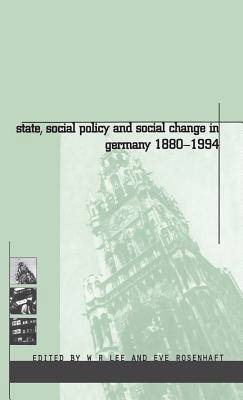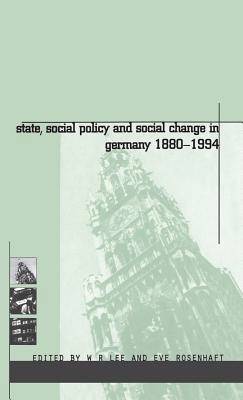
Bedankt voor het vertrouwen het afgelopen jaar! Om jou te bedanken bieden we GRATIS verzending (in België) aan op alles gedurende de hele maand januari.
- Afhalen na 1 uur in een winkel met voorraad
- In januari gratis thuislevering in België
- Ruim aanbod met 7 miljoen producten
Bedankt voor het vertrouwen het afgelopen jaar! Om jou te bedanken bieden we GRATIS verzending (in België) aan op alles gedurende de hele maand januari.
- Afhalen na 1 uur in een winkel met voorraad
- In januari gratis thuislevering in België
- Ruim aanbod met 7 miljoen producten
Zoeken
State, Social Policy and Social Change in Germany, 1880-1994
€ 296,95
+ 593 punten
Omschrijving
This classic text -- thoroughly revised to take into account the effects of unification -- explores the relationship between state policy and social change in modern German history. Particular emphasis is placed on the Wilhelmine Empire (pre-1918), the Weimar Republic (1918-1933) and West Germany since 1945.Chapters address: - the social implications of industrial medicine since the 19th century;- official attitudes to the employment of female civil servants in the Weimar Republic;- public health in the Weimar Republic; and- the role of municipal finance in 20th-century economics and politics.This is an invaluable sourcebook for students and scholars looking for insights into current debates about German state policy, the preconditions for the rise of Nazism, and the evidence that the process of reunification provides for the character of the GDR and the future of the Federal Republic.
Specificaties
Betrokkenen
- Uitgeverij:
Inhoud
- Aantal bladzijden:
- 320
- Taal:
- Engels
- Reeks:
Eigenschappen
- Productcode (EAN):
- 9781859731970
- Verschijningsdatum:
- 1/02/1997
- Uitvoering:
- Hardcover
- Formaat:
- Genaaid
- Afmetingen:
- 139 mm x 222 mm
- Gewicht:
- 512 g

Alleen bij Standaard Boekhandel
+ 593 punten op je klantenkaart van Standaard Boekhandel
Beoordelingen
We publiceren alleen reviews die voldoen aan de voorwaarden voor reviews. Bekijk onze voorwaarden voor reviews.








